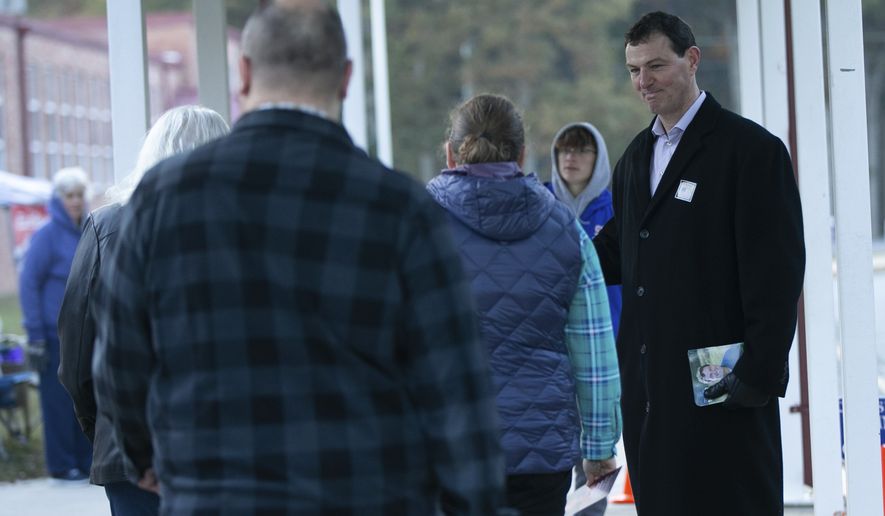Tuesday’s elections left the National Rifle Association sitting in a sea of blue.
The gun rights group’s headquarters in Fairfax County, once the place where Republican victories were built in Virginia, is now deep in Democratic territory, signaling just how far this week’s wave election crested.
The last Republican state delegate from Fairfax County lost his seat, and Republicans ceded control to Democrats of the boards of supervisors in neighboring Loudoun and Prince William counties, both of which were Republican strongholds just a decade ago.
Statewide, Democrats claimed control of both chambers of the General Assembly for the first time since the mid-1990s, and with control of the governorship they are poised to unleash an era of liberal lawmaking.
“Republicans have moved so far to the right, they have alienated the vast middle of the electorate in Virginia,” said Mark J. Rozell, dean of the Schar School of Policy and Government at George Mason University. “The suburbs, previously the key battlegrounds here, are gone to the GOP right now.”
The changes have come swiftly.
Mr. Rozell pointed out that when President Trump took office three years ago, Republicans had about two-thirds of the House of Delegates seats. Now Republicans are a minority, having ceded 15 seats in 2017 and another six this week.
In the state Senate, Republicans’ effective 21-19 majority heading into the election was flipped, and Democrats now hold a 21-19 edge.
“It was certainly a beating that the Republicans took last night. We have to acknowledge that,” Tim Hannigan, chairman of the Fairfax County Republican Party, said on WAMU’s “Kojo Nnamdi Show.” “Republicans have failed to convey what we think is a winning message to different groups in ways that are acceptable to them.”
Some of the Republicans’ House seat losses can be chalked up to a map imposed by a federal court that ruled the previous lines an illegal racial gerrymander. The new map was significantly more favorable to Democrats, and most of those redrawn districts swung for the party.
The Senate seats that flipped were perhaps more worrisome for Republicans. One came in the same Loudoun and Prince William suburbs that went Democrat at the supervisors level, too. The other seat came in the suburbs of Richmond.
Yet in the two big counties surrounding Richmond, Chesterfield and Henrico, Republicans managed to hold majorities on the boards of supervisors, signaling their suburban problem may not be statewide.
Robert Hurt, dean of Liberty University’s Helms School of Government, warned against overreading Tuesday’s results.
“You have to be very careful in drawing broad long-term conclusions,” said Mr. Hurt, a former Republican congressman and state Senate and House member in Virginia. “In my opinion, I don’t think last night was this tsunami or tidal wave. It was just enough to swamp the boat.”
He said the biggest question for Republicans hoping for a rebound is what Democrats will do with redistricting. They will have total control of the process when the census numbers are released in 2021.
Democrats had suggested a nonpartisan commission to draw the lines, but that was before they had political control of the reins of government. Those are the kinds of promises that disappear amid majorities.
The other major question is whether Gov. Ralph Northam, a Democrat who in the past had been seen as a centrist, tacks to the left to match more liberal Democratic majorities in the House and Senate.
He will get an early test on guns, a major issue in the assembly elections. Gun control groups from outside the state spent millions of dollars, swamping the home-state NRA by what one official said was a ratio of 8-to-1.
The payoff for gun control groups is likely to be swift.
Mr. Northam said Wednesday he will pursue the same package of bills he tried to get the legislature to adopt this summer, weeks after a mass shooting in Virginia Beach.
Among those bills were a ban on some semi-automatic weapons and high-capacity ammunition magazines, expanding the types of firearms transactions subject to background checks, and establishing a red-flag procedure to temporarily confiscate guns from those deemed unsafe.
The governor also said he expects action on expanding state-sponsored health care, raising the minimum wage, liberalizing laws on marijuana and expanding voter access.
Mr. Hurt said Mr. Northam, who survived a blackface scandal this year, is likely looking for a legacy accomplishment, and that could mean signing whatever liberal legislation the assembly sends him.
“We’re going to see some extreme bills filed in December,” he said.
As for Republicans, Mr. Hurt said they have shown in the past that they can be an effective vocal minority, using that platform to make the case that they are ready to be trusted with majorities again. But it will require some new thinking about the state’s political leanings.
“You have to recognize that Virginia has changed and you need to have organic candidates that come out of communities where we need to start winning again. And that is Northern Virginia, that is Hampton Roads,” he said.
Mr. Rozell said the challenge extends beyond candidates to Republican positions on the issues and how they deliver that message.
“Two strong competitive parties are key to a sound functioning democracy. The GOP is becoming almost irrelevant in the state now. When will they learn?” he said.
• Stephen Dinan can be reached at sdinan@washingtontimes.com.




Please read our comment policy before commenting.